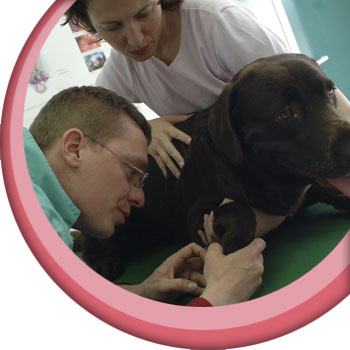What to expect in a consultation
We understand that trips to the vet can sometimes seem daunting. To make life easier we’ve put together this handy guide of what to expect.
When you arrive at the veterinary clinic you may have to wait a short time before you are seen by the vet. Most veterinary surgeries will understand that not all of our pets enjoy this and will do their best to make it as stress free as possible.
Don’t worry if your dog doesn’t get on with other dogs or cats, but it may be best to stay outside if the waiting room is very busy and to just let the receptionist know that you’re there.
Often there will be a separate area for cats in order that they don’t get too upset by big noisy dogs nearby.

Weight
Your vet may weigh your pet during the consultation. Don’t worry if your dog is not very good at getting on the scales, this is a common problem and usually they will get there with some encouragement! There are several reasons for weighing your pet:
• Some conditions are associated with weight loss or gain, therefore weighing them may help with diagnosis.
• Some conditions may be affected by your pet being overweight such as joint conditions, or it may make them more likely to suffer conditions such as diabetes mellitus (high sugar levels in the blood).
• Having an accurate weight will allow accurate dosing if any medication is prescribed.
Taking a history
This is the section of the consultation where the vet will ask you questions about your pet’s condition. Some of the questions may seem irrelevant but bear with them as these questions may help to identify an underlying condition. Some questions to expect are:
• What signs you have noticed, how often, how long for, and whether they were sudden or gradual in onset.
• Changes in appetite or thirst.
• Whether they are going to the toilet normally.
• If they are vomiting.
• Any pain.
• Changes in behaviour or demeanour.
• If there have been any changes in diet, routine or exercise.
Examination
Sometimes people and their pets can find this section of a consultation quite stressful but your vet will do their best to keep it as stress-free as possible. Not all pets enjoy being examined, especially if it includes things that they are not used to. Don’t worry if this is the case, your pet will certainly not be the only one! If you think your pet would be better with a nurse holding them you can always ask. Your vet will perform a full examination of your pet, and then may focus on a specific area depending on the symptoms described. This may include checking:
• Ears, eyes, mouth and teeth.
• Colour – whether their gums look pale or a normal pink colour.
• Lymph nodes (their 'glands') – they may be bigger in certain conditions. These are found in many locations in the body. The ones most easily felt are in the neck and behind the knees.
• Chest – they will listen to your pet's heart and lungs.
• Abdomen – they will feel for anything abnormal and see if anything is painful.
• Temperature.
• Behaviour in the consult room – are they are interested and alert or a bit quiet?
• Skin and coat.
• Body condition – are they the right weight?
• Limbs, back and neck if necessary.
• Any lumps and bumps noticed.
Following this your vet may be able to suggest a diagnosis and course of treatment, or they may need to carry out further tests such as those detailed in the ‘Diagnostic Tests’ section. They will understand that it can be very worrying when your animal is unwell; don’t worry about asking them to explain things further if you are unsure about what anything means.
Disclaimer: This website has been designed to offer information surrounding the use of antibiotics and infection control for pet owners. It does not replace advice from your veterinary surgeon. If you believe your pet is unwell or you have any questions relating to their treatment, please always contact your veterinary surgeon for advice.

